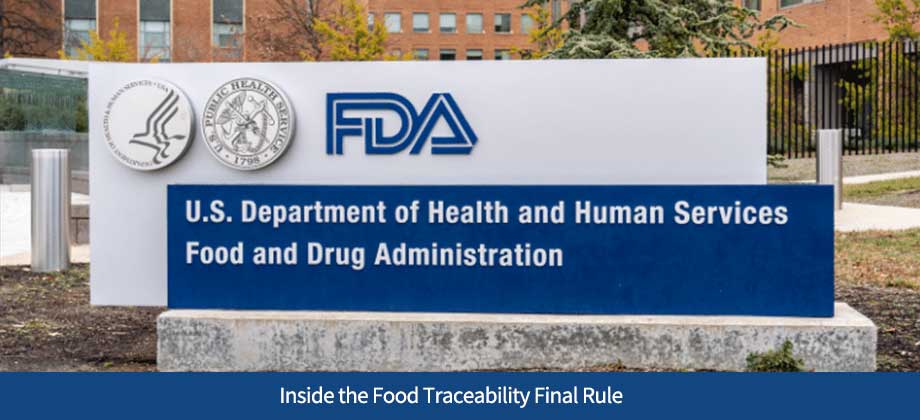Inside the Food Traceability Final Rule

The Food and Drug Administration (FDA) passed the Food Safety Modernization Act (FSMA) in an effort to go from “reactive” to “proactive” in response to preventing foodborne illnesses. The reason? The global economy relies upon nations across the planet for nearly every manufactured good, including food. Should one crop of spinach get contaminated with salmonella, the impacts are far-reaching and the consequences to public health can be dire.
According to the FDA’s website, “ensuring the safety of the food supply is a shared responsibility among many different points in the global supply chain for both human and animal food. The FSMA rules are designed to make clear specific actions that must be taken at each of these points to prevent contamination.” Under the FSMA Section 204(d), the FDA issued something called the Food Traceability Final Rule—”designed to facilitate faster identification and rapid removal of potentially contaminated food from the market, resulting in fewer foodborne illnesses and associated deaths,” according to Food Safety Magazine. What’s it all about? Let us explain…
The Details
The Food Traceability Final Rule was designed to establish recordkeeping requirements for anyone that manufactures, processes, packs, or holds foods that are included in something called the Food Traceability List (FTL)—and it applies to both domestic and foreign manufacturers that are putting food out for U.S. consumers. These entities need to “maintain records containing Key Data Elements (KDEs) associated with specific Critical Tracking Events (CTEs); and provide information to the FDA within 24 hours or within some reasonable time to which the FDA has agreed,” as reported on the FDA’s website. Critical Tracking Events include harvesting, cooling, packing, and shipping; a comprehensive list of KDEs and CTEs can be viewed and downloaded here (check out Page 11 of the guide to learn about the Traceability Plan requirements that are also a part of this final rule).
Under the final rule, records need to be in their original form—either paper, electronic (e.g., working links), or true copies. They have to be easily legible and stored safely, in a manner that will prevent damage or destruction.
The FTL
If you’re not familiar with the Food Traceability List (FTL), it includes specific foods outlined by the FDA that require additional traceability recordkeeping and are subject to the Food Traceability Final Rule. Think of them as foods that need a little extra insurance policy to keep consumers safe. It’s an extensive list to be sure (you can access the entire thing here), but you’ll see a lot of the usual suspects: cheeses, shell eggs, nut butters, several types of fresh greens and fruits, fresh and frozen fish, and deli salads.
The Deadline
Folks that must begin adhering to these recordkeeping requirements have until January 20, 2026, to come into compliance—a date that sets an even playing field for all participants. For comprehensive details, the complete FTL, frequently asked questions, contact information, and more, check out FDA.gov.
There are always updates to food safety requirements and new regulations to stay on top of. Make sure to do your homework by checking in regularly with ARF Financial’s informative blog, the Financial Pantry. We cover the latest in all things small business, plus we’re experts when it comes to loans and lines of credit. Whether you’re ready to expand or need extra cash to invest in training, equipment, or a full-on website redesign, the pros at ARF Financial are ready to help. Visit today to learn why so many business owners like you have turned to ARF Financial for all their small business needs.
Your privacy is important to us. ARF Financial will never sell or rent your information to any third party. Click here for more information about our privacy policy.

